Sustainable Coffee Bean Varieties: Brewing a Greener Cup
Introduction
Coffee is deeply woven into cultures and communities globally. An estimated 2.25 billion cups of coffee are enjoyed daily around the world. Behind these cups are over 25 million coffee farmers caring for coffee plants and harvesting their bountiful seeds – the coffee beans. The increasing demand for coffee means that sustainable growing practices are essential for environmental, social, and economic health. Sustainable Coffee Bean Varieties are an important part of the sustainability solution.
This article explores Sustainable Coffee Bean Varieties and farming approaches that promote sustainability from crop to cup. We will review resilient coffee plant varieties, sustainable growing methods, certifications, and more. The goal is to highlight the practices of making coffee growing ecologically regenerative, climate-smart, and ethical for all involved.
Key Takeaways
- Importance of Sustainability: Coffee sustainability is vital due to increasing global demand.
- Sustainable Factors: Key factors include soil health, responsible water use, biodiversity, and community investment.
- Coffee Varieties: Arabica and Robusta have unique traits for growers to consider.
- Certifications and Choices: Certifications matter, and consumers can drive sustainability by choosing wisely.

The Coffee Plant: Needs for Sustainability
Let’s begin by understanding the basics of the coffee plant and its needs:
- Coffee plants are evergreen shrubs that produce coffee cherries when grown in suitable warm climates and elevated altitudes.
- The average coffee plant takes 3-5 years to produce its first crop, then yields coffee cherries for 15-20 more years.
- Inside each red or yellow coffee cherry are the seeds that become the green coffee beans we harvest.
- Growing coffee sustainably means meeting the plants’ needs while also protecting long-term environmental health.
Some key points for sustainable coffee agriculture include:
- Maintaining healthy soil through erosion control and organic fertilization
- Responsible water use and rainwater harvesting for irrigation
- Preventing deforestation by using shade trees or existing forest canopy
- Applying integrated pest management and natural controls
- Fostering biodiversity with shade systems and habitat conservation
- Using organic waste for composting and energy production
- Building climate resilience through flood and drought preparations
- Training farmers in sustainable techniques like composting, integrated pest management, and agroforestry
- Investing in community development projects like health clinics, schools, and clean water access
Sustainable Coffee Bean Varieties specifically refer to coffee plant cultivars selected for traits like disease resistance, climate adaptation, and quality. Let’s look closer at bean variety choices.
Sustainable Coffee Varieties
The two commercially dominant coffee species are Coffea Arabica and Coffea Canephora, known as Arabica and Robusta. Arabica accounts for around 60% of global coffee. Robusta, about 40%.
Arabica beans have a sweeter, more complex flavor. However, Robusta contains more caffeine and a higher yield potential.
Which variety is more sustainable depends on many factors:
Environmental
- Arabica’s high altitude needs can lead to deforestation
- Robusta is more disease-resistant and can grow in diverse environments
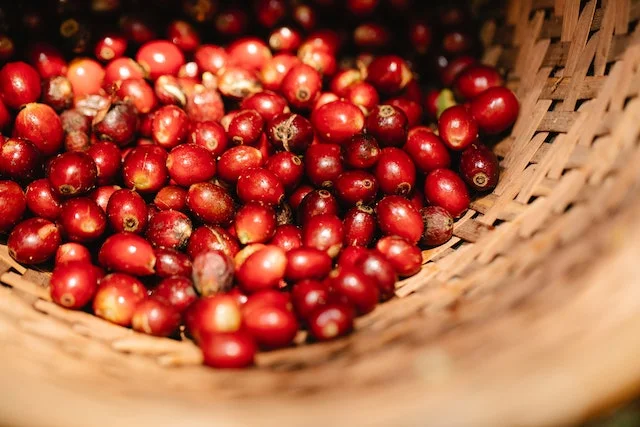
Economic & Social
- Arabica brings higher prices for quality, benefiting farmers
- Robusta provides higher yields to increase farmer income
- Both can provide livelihoods if grown using sustainable methods
Here are some Sustainable Coffee Bean Varieties gaining popularity:
- Bourbon: This heirloom Arabica variety is known for its excellent cup quality and disease resistance. It is grown in many countries, including Brazil, Rwanda, and Colombia1.
- Geisha: This rare high-end Arabica variety from Ethiopia is known for its intense floral notes and is often considered one of the most expensive coffees in the world. It is grown in countries such as Panama, Colombia, and Costa Rica1.
- Typica: This sweet, balanced Arabica variety thrives at high altitudes and is known for its good cup quality. It is grown in many countries, including Mexico, Guatemala, and Papua New Guinea1.
- Gesha: This renamed “Geisha” variety originated in Panama and is known for its unique flavor profile that includes floral and citrus notes. It is grown in countries such as Colombia, Costa Rica, and Panama1.
- Catimor: This Robusta-Arabica cross is known for its disease resistance and ability to grow well in low altitudes. It is grown in many countries, including Indonesia, Vietnam, and Timor-Leste2.
- SL28 & SL34: These disease-resistant cultivars were pioneered in Kenya and are known for their good cup quality. They are grown primarily in Kenya but have also been introduced to other countries such as Tanzania and Rwanda3.
- Icatu: This Robusta-Arabica hybrid produces good yields and has pest resistance. It is grown primarily in Brazil but has also been introduced to other countries such as Nicaragua and Honduras4.
Research also breeds climate-resilient varieties like:
- Disease-resistant cultivars: To combat coffee leaf rust, nematodes, and other diseases
- Drought-tolerant varieties: Withstand dry periods, often deeper root systems
- Heat-adapted varieties – Thrive as climate warms, maintaining bean quality
- Slow-ripening varieties: Spread out the harvest period to ease labor demands
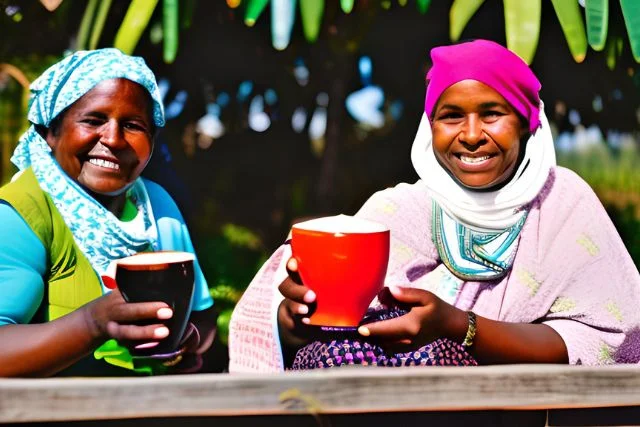
These innovations in Sustainable Coffee Bean Varieties confer climate and pest resilience. Researchers are also cataloging wild coffee species and ancestral varieties to identify beneficial genes that can improve future sustainability.
The Role of Terroir
Terroir refers to how geography affects a coffee’s quality and taste – from soil, elevation, and climate to processing. Notable terroirs producing sustainable coffees include:
- Yirgacheffe, Ethiopia: Volcanic soil and high elevation yields floral, citrusy organic Arabica beans grown under shade.
- Huila, Colombia: The Loamy soil and microclimate of this high plateau produces sweet, balanced shade-grown and Fair Trade certified Arabica.
- Aceh, Sumatra: Mineral-rich volcanic soil around Lake Toba generates full-bodied and earthy shade-grown organic Arabica.
- Tarrazú, Costa Rica: Strict regulations in this mountainous valley mandate shade coverage for balanced, complex organic Arabica.
- Kintamani Bali: Volcanic soil, tropical climate, and high elevation create unique terroir for small-farm Arabica grown under a shade canopy.
- Blue Mountain, Jamaica: Lush and misty slopes with mineral-rich soil produce smooth, balanced Arabica beans.
These examples demonstrate how place-based factors like terroir affect Sustainable Coffee Bean Varieties and cultivation.
Sustainable Coffee Certifications
Certifications provide guidelines and standards for sustainable production. Major coffee certifications include:
| Certification | Key Practices and Benefits |
| Fairtrade | Minimum price for farmers encourages direct trade relationships |
| USDA Organic | Grown without synthetic chemicals, GMOs or artificial substances |
| Rainforest Alliance | Integrated farm management to protect forests, water, soil, wildlife |
| Smithsonian Bird Friendly | Shade cover plus organic requirements for biodiversity |
While voluntary, certified sustainable coffees signal commitments to environmental stewardship and ethical treatment of farmers. Criticisms exist around standards, costs, and accessibility – but certifications remain an important driver of sustainability.
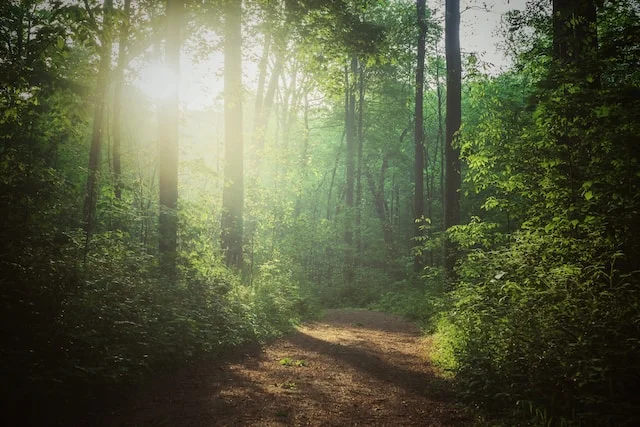
Supporting Sustainability: Consumer Choices
Consumers can actively support sustainability through choices like:
- Read labels – Look for credible certifications and terms like “shade-grown” or “bird-friendly”
- Buy directly – Source through food co-ops or directly from eco-conscious farms and roasters
- Buy from sustainable brands – Support companies with ethical sourcing and transparency
- Reduce waste – Use reusable pods/filters instead of single-use plastic pods, compost grounds
- Efficient brewing – Opt for drip brewers or pour-over instead of energy-intensive espresso machines
- Buy in bulk – Choose large bags instead of small packages to reduce materials
- Store properly – Keep beans cool, dry and in airtight containers to maintain freshness and reduce food waste
Through purchasing and brewing habits, consumers collectively influence the market toward green, ethical Sustainable Coffee Bean Varieties.
The Future of Sustainable Coffee
Innovation, collaboration, and adaptation will drive future coffee sustainability:
- Research develops more climate-resilient and high-yielding Sustainable Coffee Bean Varieties
- Public and private initiatives fund pilot sustainability programs at origin
- Climate change adaptation helps farms remain viable through strategies like irrigation, shade adjustment and switched varieties
- Education and training empower farmers to implement sustainable techniques
- Carbon sequestration incentivizes agroforestry to sequester carbon in shade trees and soil
- Crop diversification provides additional income streams for farmers through food crops and timber
- Technology boosts efficiency, transparency, and traceability across the supply chain
Overall, the future success of globally sustainable coffee relies on shared efforts across the supply chain.
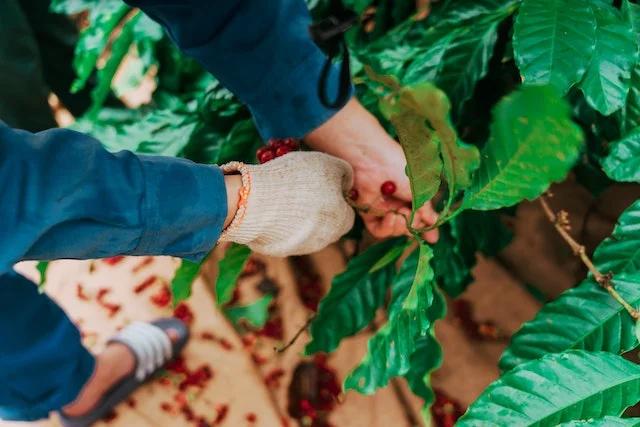
Recent Developments
Notable recent developments related to research of more sustainable coffee bean varieties include:
- Nestlé plant scientists have developed a new generation of low-carbon coffee varieties that are more drought-resistant and deliver up to 50% higher yields per tree compared to standard varieties. These breakthrough varieties significantly reduce the carbon footprint associated with coffee consumption and help farmers earn a better living by enabling them to grow more high-quality coffee on the same amount of land, sustainably. Nestlé is also developing new higher-yielding Arabica varieties bred to be more resistant to ‘coffee leaf rust’ – a disease that has devastated coffee plantations across the Americas.
- Scientists from the Royal Botanic Gardens, Kew, the University of Greenwich, CIRAD (the French Agricultural Research Centre for International Development), and Sierra Leone have discovered a ‘rediscovered’ coffee species called Coffea stenophylla that has the potential to ensure the future of great-tasting coffee under climate change. The coffee species has a unique combination of tolerance to high temperatures and resistance to drought, making it more resilient to climate change.
Sustainability Success Stories
Many exemplary farms and companies showcase sustainable coffee leadership:
- Café Britt (Costa Rica): Carbon-neutral plantation with award-winning sustainable coffees. Solar-powered processing.
- Camino Verde (Colombia): Small farmers restoring degraded land to grow organic coffee under diverse native forests.
- Patagonia Provisions: B-Corp certified company producing carbon-neutral coffee through regenerative organic farming.
- De La Gente (Mexico): 3rd-generation family farm with ecosystem preserving native forest and organic shade-grown coffee.
- Coffee Barrel (Indonesia): Woman-led exporter sourcing traceable, organic Arabica coffee from smallholder farmers.
- CaféDirect (UK): One of the first Fairtrade coffee brands, 100% sourced from grower co-ops. Funds sustainability programs.
These innovators and many more demonstrate sustainable coffee can protect both people and nature.
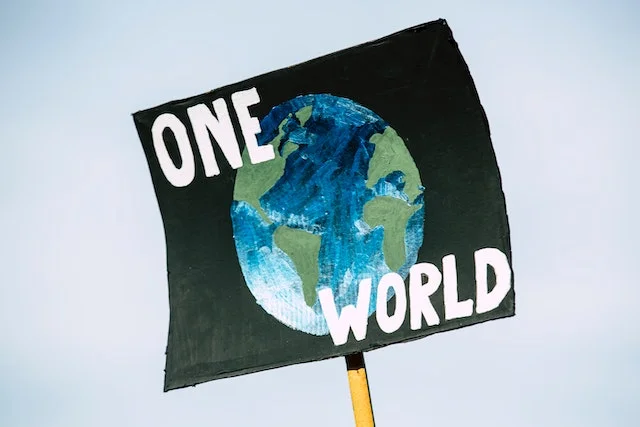
Conclusion
No universally “most sustainable” coffee bean exists. Rather, sustainability depends on practices like organic farming, biodiversity conservation, ethical trade – and sourcing Sustainable Coffee Bean Varieties suitable for each region’s climate, soil, and terroir.
The collective efforts of farmers, scientists, certifiers, companies, and consumers can continue driving coffee culture toward a more regenerative, equitable future. Our daily cup of coffee can be a force for building climate resilience and supporting farming communities.
With informed, ethical choices, coffee can be a sustainably produced product that benefits all involved – from the cherries ripening on trees, to the farmers harvesting them, to the consumers brewing them into an invigorating beverage. The future of coffee lies in recognizing its power to connect us to nature, each other, and the world we share.








